Superman and Jesus Christ—an interview with author Stephen Skelton about parallels between the popular, fictional superhero and the Son of God
by Chris Monroe
Staff Writer
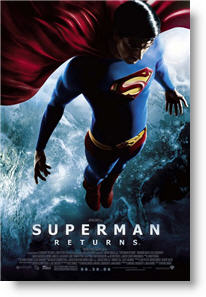
See our film review page for more information.
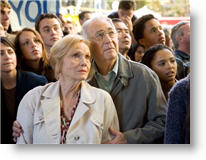

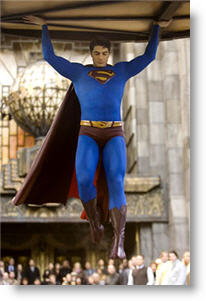
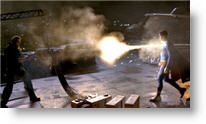
Is Jesus Christ a man, or is he God? Answer
If Jesus is God, how could he die? If Jesus died on the cross, then how can he be alive today? Answer
Was Jesus Christ God, manifest in human form? Answer
Is Jesus Christ really God? Answer
If Jesus was the Son of God, why did He call Himself the Son of Man? Answer
Trinity—How can one God be three persons? Answer
Has science disproved the miracles associated with Jesus Christ? Answer
How can we know there’s a God? Answer
Why does God allow innocent people to suffer? Answer
 Book author Stephen Skelton
Book author Stephen SkeltonStephen Skelton, author of the book The Gospel According to the World’s Greatest Superhero, has clearly done his homework finding parallels between Superman and Jesus Christ. However, most of the work done to make a connection between the two saviors seems to be done for him, making his work more about research than anything else. What is interesting about the analogies is that they are not ideas dreamt up by fanatical lovers of comics or even by people of faith deliberately looking for religious significance.
What Skelton’s work uncovers and explores is that the very ones making the messianic references are the ones responsible for fashioning the character of Superman over the years.
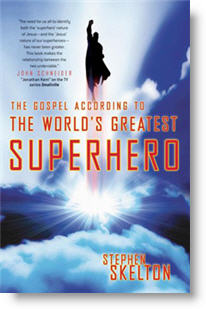
At first, Skelton thought that the comparisons between Superman and Jesus Christ were mere coincidence. But the idea that it could be more, combined with the rumor of the release of another Superman movie, prompted Skelton to investigate. What Skelton’s research uncovered is that the parallels between the two saviors are not only clear, but also deliberate. Skelton then not only emphasizes the validity to comparing Superman with Jesus, but also takes it further to mention the significance and purpose that this can have on those who experience the Superman story.
Probably the most striking parallel is evident in the relationship between the character of Superman and his father. Skelton notes how in 1942 author of the first Superman novel, The Adventures of Superman, George Lowther, changes the name of Superman, Kal-L, to “Kal-El” and Superman’s father, Jor-L, to “Jor-El.” It sounds similar, but what is the significance? The word “El” in Hebrew means “God.” So the significance in the story of Superman is how “El” (God) the father sends “El” (God) the son to Earth. Sound familiar?
Perhaps this is coincidence, but Skelton emphasizes another point made by another Superman storyteller. This time it is author of the screenplay for Superman: The Movie (1978), Tom Mankiewicz, who says on the DVD:
“The metaphor was clearly there when Jor-El sends Superman to Earth with God sending Christ to save humanity.”
This is not merely intimation, but an explicit explanation of the resources the author was working from.
More recently, Skelton points out how director of the hit television series “Smallville”, David Nutter, confesses to working in precisely the same manner. Specifically in the episode when Clark is hung up on a scarecrow mast (much like a cross) by some bullies, Nutter says,
“I thought there were a lot of metaphors between Clark and Jesus actually. And I tried to throw in as many of them as I could.”
Yet again, Skelton is pointing out another Superman storyteller who directly acknowledges the Christ story.
Now in the most recent Superman story, Skelton has yet again found concrete comments from director Bryan Singer in how he tells the Superman story in “Superman Returns”. In one article, Skelton has quoted Bryan Singer as saying,
“There’s definitely and allegory—a Judeo-Christian allegory—that’s happening in the mythology of Superman, right up to the fact that he descends from the heavens.”
Skelton has also quoted Singer as stating that “Superman is the Jesus Christ of superheroes,” and that “Superman Returns” is “a story about what happens when messiahs come back.” Early on in the casting process, it is also reported that James Caviezel (“The Passion of the Christ”) was being considered by Warner Brothers to play Superman.
Beyond making these “Christic” connections with Superman, Skelton also desires to bring out the significance of having such parables. For Skelton, it’s obvious that Superman is a kind of parable that can tell us the Christ story in more indirect way. When I spoke with him, Skelton told me the story of how he took a friend (who is not a believer in Christ) to see “Superman Returns”.
One comment that Skelton’s non-believing friend made afterwards was that “Superman Returns” spoke more to him about the Gospel than did Mel Gibson’s “The Passion of the Christ”. This idea is completely subjective, but Skelton’s point is to emphasize the power of parables. Much of his book, The Gospel According to the World’s Greatest Superhero, is also built on the idea of how Jesus consistently used parables to talk about the kingdom of God.
Using the media of our day to emphasize spiritual truth is nothing new to Skelton. He describes his work as “a parable approach to teaching”—much like he does with the Superman story. He has taken television shows, such as the “Dick Van Dyke Show” and “The Andy Griffith Show” and derived video Bible studies from them. His purpose—as with the Superman story—is to give a Gospel perspective using these stories. He explains that he uses the stories as a springboard for Scriptural application.
Of course, Skelton has received criticism in his work, specifically with his work revolving around Superman. Some have accused him of implying that Jesus is not interesting enough, so he has to bring in Superman to spruce it up. Interestingly, however, when Skelton shared this bit of criticism with a newspaper reporter, the reporter turned that criticism on its head. The reporter said, in essence, that those responsible for bringing the Superman story to the world thought that Superman was the one not interesting enough—so they brought in Jesus.
While there is too much information to discuss here pertaining to Skelton’s Christic correlations with Superman, he has stated that his book, The Gospel According to the World’s Greatest Superhero, takes a Christian stance. He says,
“The meaning that the book derives from the parallels between Christ and Superman is Christian meaning. When we ask how this has happened and why it is so widely accepted, the answer comes from that Christian perspective.”


Are you good enough to get to Heaven? Answer
How good is good enough? Answer
Will all mankind eventually be saved? Answer
ETERNAL LIFE—What does the Bible say about it? Answer
Eternal death in the Bible
He also says,
“Certainly I do offer my opinion based on the facts, my interpretation based on how—given the events of the Superman story—the parallels can be drawn to the Christ story. And I also give great weight to the idea of the truth being paralleled, which I define as the Christian truth, that the Christ is the true story.”
Stephen Skelton work is part of The Entertainment Ministry, which can be found at www.entmin.com.
See our review and comments page on the latest Superman movie, “Superman Returns”.

Christian John Schneider’s endorsement of Stephen Skelton’s book…
“The need for us all to identify both the ‘superhero’ nature of Jesus—and the ‘Jesus’ nature of our superheroes—has never been greater. This book makes the relationship between the two undeniable. If you aren’t afraid to think, I mean really think… pick up this book! It will open your mind to ideas and comparisons that are sure to both delight and challenge you. It’s a sure bet to be sitting on the ‘Kent’ coffee table!”
—John Schneider, who played “Jonathan Kent” in the “Smallville” TV series; cofounder of the Children’s Miracle Network
